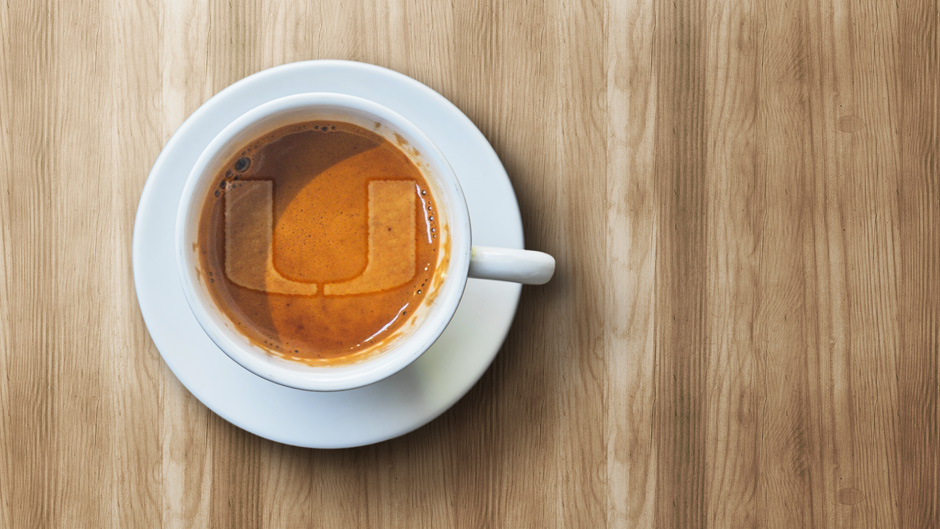You can find a coffee shop on almost every city block. Caffeine has been ingrained into our daily routines, part of our collective psyche—all because of its effect on our brain chemistry.
Arlette Perry, director of the Laboratory of Clinical and Applied Physiology at the University of Miami School of Education and Human Development, explained that our dopamine and serotonin levels increase when caffeine is consumed.
Primarily, serotonin plays a role in regulating our moods while dopamine is involved with motivation and attention.
Perry pointed out that because of the increases in these specific hormones, caffeine intake creates a feeling of pleasure and satisfaction. This is a large reason why more than 60 percent of the population is dependent on that caffeine jolt in the morning.
People tend to engage in behavior that brings them pleasure and satisfaction, indicating the reason so many continue to drink coffee, Perry stated.
So, is consuming caffeine a healthy pick-me-up choice?
Because caffeine is addictive, there’s always a balance, said Alyson Marquez, a registered dietitian for the University of Miami Dining Services. “The lifestyle choices that we make the majority of the time are those that affect our health the most,” she said.
According to experts, eventually you will grow a tolerance for caffeine and will need to increase your consumption. “That's when you need to watch it,” Perry cautioned.
If you are trying to manage your body composition, drinking coffee has shown positive results in body fat loss, especially in men. It also can boost your metabolism and reduce your appetite. Marquez explained that creamers, syrups, and sugars can go against weight management goals.
The U.S. Food and Drug Administration warns that common negative side effects to drinking coffee could include an upset stomach, headaches, insomnia, and more. But everyone’s experience with coffee is different, regardless of whether you consume it on an empty stomach or with food. This is why Marquez advises that you listen to your body and see how it reacts to caffeine intake.
“The increase of gastric acid can irritate the lining of the stomach, causing inflammation and gastritis,” Perry said.
Those who experience inflammation of the urinary tract may need to reduce or eliminate caffeinated coffees. However, for others, it can “improve motility and movement through the gastrointestinal tract, which may improve elimination and regularity,” Perry added.
Anuradha Ramdas, an avid caffeine drinker and a graduate student who is earning her master’s degree in public health at the Miller School of Medicine, had to find an alternative. “Coffee was affecting my stomach, so I tried Celsius,” an energy drink, shared Ramdas, who is also a member of the Public Health Student Association.
Ramdas cares about her health and is aware of the negative effects of caffeine. “It is unfortunate that I cannot prioritize my health over my school work,” she said. But points out that if she doesn’t have her caffeine intake, she won’t be able to focus. Unfortunately, caffeine has become a necessary part of her daily routine.
“I would recommend avoiding energy drinks,” advised Marquez. Energy drinks aren’t the most optimal substitute for an energy boost, she noted. And the primary effects of energy drinks negatively impact the nervous system. They also can increase blood pressure, heart rate, and increase breathing, she added.
But there are alternatives to consuming caffeinated drinks. You can find beverages with reduced amounts of caffeine. Decaffeinated coffee, though not truly decaffeinated with about 2 mg of caffeine in a cup, may help. “It makes you feel that you are drinking caffeine,” said Perry.
There are some teas that provide you with zeal but have less caffeine per 8 oz. cup. A few are green tea with 30 mg of caffeine, oolong tea with 38 mg, and black tea with 48 mg, compared to coffee with about 95 mg.
According to the experts, teas are better alternatives. And they provide health benefits—such as improved cardiovascular health, reduced blood pressure, improved blood sugar levels, and even a decreased risk of cancer. Drinking herbal decaffeinated tea could improve your night’s rest, Marquez noted.
To help reduce the effects of caffeine, stop consuming it six to eight hours before bedtime. And if you’re looking for a vibrant start to your day without caffeine, Perry recommends exercise—while being well hydrated and nourished. Also be sure to take a healthy dose of carbohydrates and vitamins.
A caffeinated drink “may not be necessary if you are getting all your nutrients,” Perry said. She emphasized that what is more important than your caffeine intake is what you feed your body after exercising.
“Hydration is key, especially in South Florida. It's important to fuel your body with proper protein, carbohydrates, and fluids,” she added.
Consuming caffeine may not be troublesome for everyone. However, Perry and Marquez both agree that it should be consumed in moderation.

